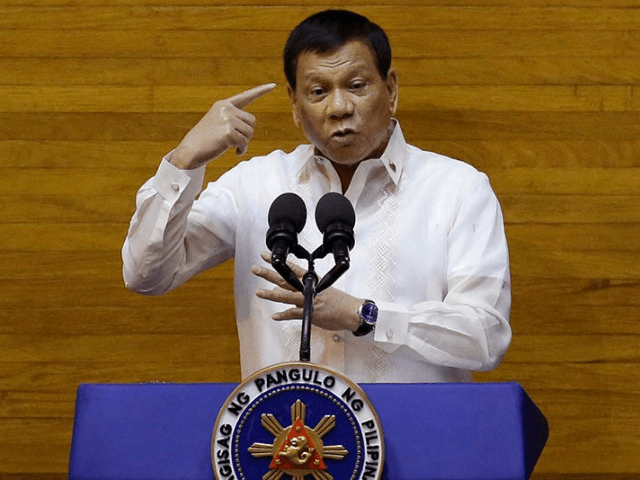Philippines President Rodrigo Duterte vowed an “unrelenting” fight against the drug trade, panned critical media outlets as “American-owned,” complained of rats in the presidential palace, and admitted, “Sh*t, I am willing to go to prison for the rest of my life” in his second State of the Nation address Monday.
Observers described the address—which also featured a demand to the United States to hand over bells taken from the Philippines in 1901 and passing references to the ongoing horror in the Islamic State-controlled city of Marawi—as “vintage Duterte,” noting that he “cursed more” than in his first such address. The annual State of the Nation speech functions as the Filipino equivalent of the American State of the Union address.
The extensive full transcript of the two-hour-plus speech published by the Philippine Star features heavy censorship and easy shifts from English to Filipino and back. What it fails to deliver on is a coherent vision for the future of the Philippines; instead, it is marked by concern for the future, fear of greater violence, and obsessive concern with issues that seem of minor importance compared to the major insurgencies that have developed in the past year.
Duterte begins the speech in a relatively formal manner, telling listeners, “there is no problem in the world which can stop the march of a people with unflinching and tenacious determination.” He makes clear that the fight against the illegal drug trade remains his top priority—his promise to eradicate the pervasive drug problem in the country is what won him the presidency, many argue.
“I believed then, as I believe still, that progress and development will sputter if criminals, illegal drugs, illegal users of drugs are allowed to roam the streets freely, victimizing seeming with impunity, the innocent and the helpless,” he asserted:
That is why, I have resolved that no matter how long it takes, the fight against illegal drugs will continue because that is the root cause of so much evil and so much suffering [applause] that weakens the social fabric and deters foreign investments from pouring in. The fight will be unremitting as it will be unrelenting. Despite international and local pressures, the fight will not stop [applause] until those who deal in it understand that they have to cease, they have to stop because the alternatives are either jail or hell. [applause]
Duterte also encouraged listeners to call anonymous government hotlines to report government corruption, lamenting of the political and criminal landscape, “there is a jungle out there.”
To drug traffickers, he promised, “I will hound you to the very gates of hell.” While leaving the topic temporarily, Duterte returns to drugs when asking Congress to legalize capital punishment, which the Philippines had ceased to allow. There he mentions “a short clip of CNN about people in Massachusetts, was it there?” that allegedly showed drug addicts “there, they live under the bridge, they are getting thin, they are doing nothing.”
Duterte mentions Marawi with lament, calling the Islamic State’s success there “a terrible blow to our quest for peace” and radical Islam “an alien ideology” to the over ninety percent Christian nation. He shifts rapidly to condemning mining companies for damaging the Philippine environment, however, and spends much more time on the subject of climate change and conservation.
Amid a torrent of complaints about the mining industry, Duterte turns to the media. “You know, you’re a newspaper you’re supposed to be 100-percent Filipino. And yet when you start to pierce their identity, it is fully owned by Americans,” Duterte said of two outlets in particular, ABS-CBN and Rappler, noting that the Philippine constitution only allows Filipino-owned media companies to incorporate within the nation’s borders. Rappler denied the accusation entirely, stating in an article on the attack, “Rappler is 100 percent Filipino-owned.”
In other notable highlights of the extensive address, Duterte complained that “all the rats of [the Pasig River]” live in the presidential Malacanang Palace and demanded the United States return the Balangiga bells, taken from the islands in 1901. Duterte has previously refused to live in Malacanang citing the presence of ghosts there. As for the bells, Duterte’s attack on the United States follows public remarks in which he said he would never visit the country, despite being invited by President Donald Trump, because America is “lousy.” Duterte has also previously claimed that “for every five Americans, three are idiots.”
“We are aware that the Bells of Balangiga have deep significance for a number of people, both in the United States and in the Philippines. We will continue to work with our Filipino partners to find a resolution,” U.S. Embassy press attache Molly Koscina said in a statement following the address.

COMMENTS
Please let us know if you're having issues with commenting.